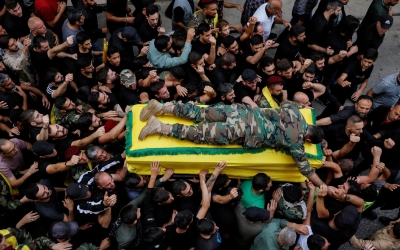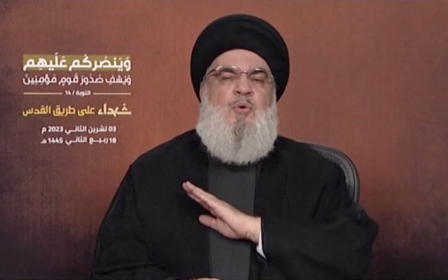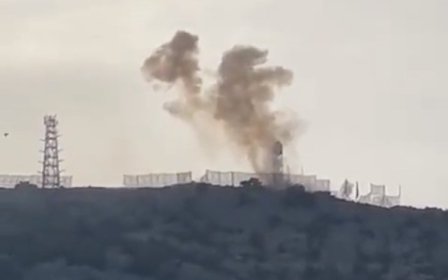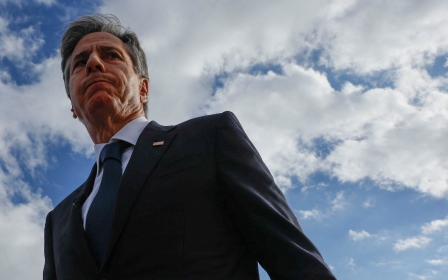Israel-Palestine war: Three sisters and grandmother killed by Israeli air strike in Lebanon
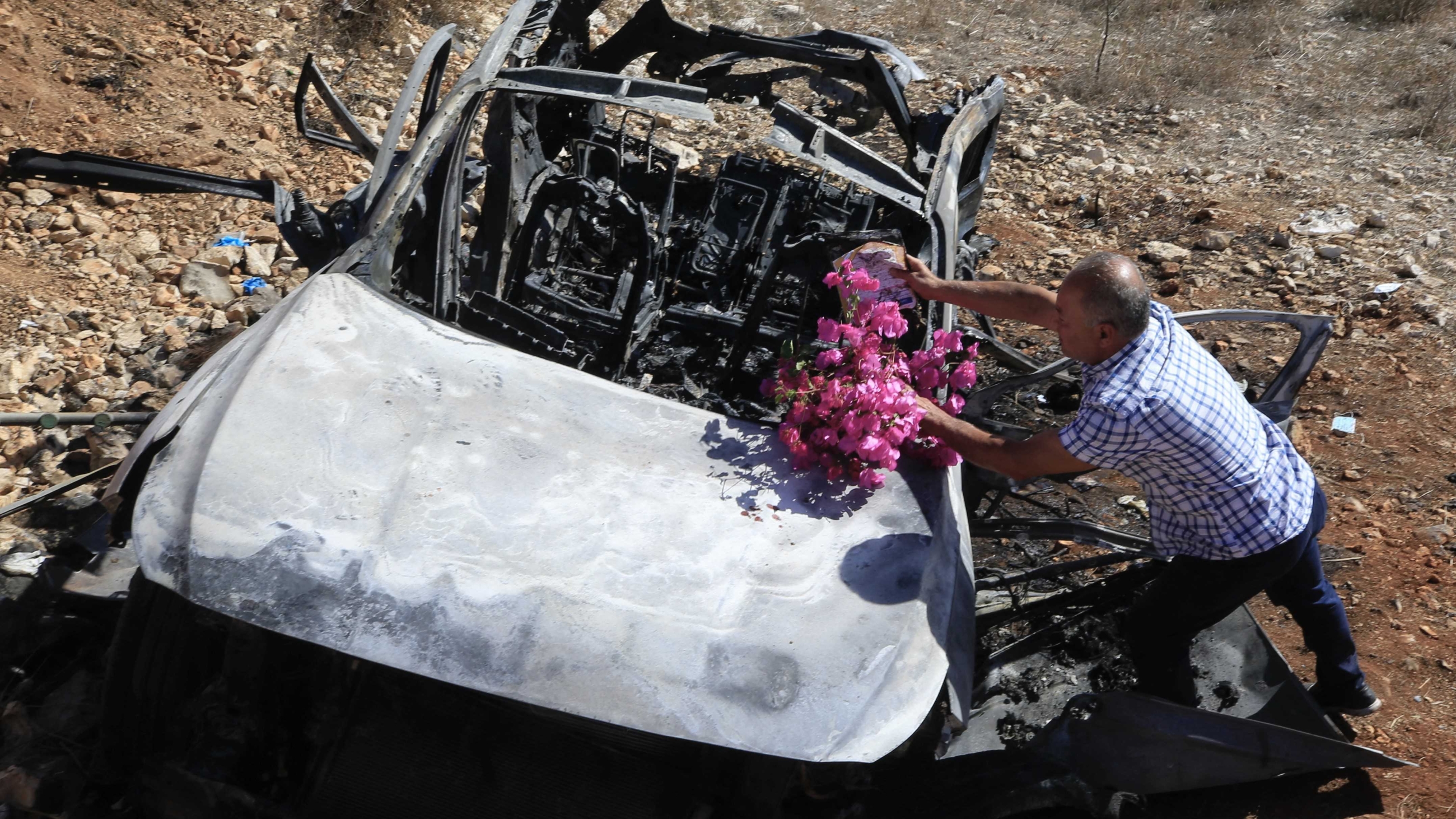
Israeli air strikes killed four civilians in Lebanon on Sunday, including three children, amid fears that sporadic exchanges of fire on the country’s southern border could lead to all-out war.
The attack hit a civilian car in Aynata, roughly 10km from the border with Israel, and killed relatives of Lebanese journalist Samir Ayoub, who was driving in front of them.
“The children were screaming in the car, I did not know what to do,” he told Middle East Eye.
Remas, Taleen and Layan Mohamad Shour, aged 14, 12 and 10 respectively, were killed along with their grandmother Samira, aged 60, who was Ayoub’s sister. The girls’ mother, Huda, survived and is currently in hospital.
Ayoub was able to pull Huda out of the car as the flames consumed the vehicle.
New MEE newsletter: Jerusalem Dispatch
Sign up to get the latest insights and analysis on Israel-Palestine, alongside Turkey Unpacked and other MEE newsletters
“Their mother was screaming, ‘I want my children!’ And the kids were burning in the car in front of her, and there is no one, what are you going to do,” he said.
Border clashes between Hezbollah, allied groups and Israel started a day after a Hamas-led assault from Gaza killed more than 1,300 people in Israel on 7 October.
Israel's relentless bombing of Gaza since then has killed over 10,000 Palestinians, including at least 4,400 children.
Hezbollah says it has lost at least 60 fighters in its clashes with Israel.
In a long-anticipated speech on Friday, Hezbollah leader Hassan Nasrallah threatened Israel that any additional civilian death would be retaliated against. Israel had already killed five Lebanese civilians and one journalist by then.
Follow Middle East Eye's live coverage for the latest on the Israel-Palestine war
“A civilian for a civilian,” he said.
In response to the Sunday killings, the militant movement fired Katyusha rockets at the northern Israeli town of Kiryat Shmona, hitting a car and allegedly killing one civilian.
'Inseparable'
As the rockets rained down, a community in Lebanon is grieving.
“The people of the village are, of course, in shock,” said Riad Fadlallah, mayor of Aynata, speaking from a funeral procession held for the affected families in Beirut.
The girls were from Blida, a nearby town, while their mother is from Aynata. The grandmother, Samira, originated from Aitaroun.
The children attended the Sacred Hearts School in the Christian town of Ayn Ebel, which announced a day of mourning in honour of its lost students.
Schools in many districts of southern Lebanon have been closed due to the recurring border clashes, and thousands of Lebanese residents have been internally displaced.
The Shour family had moved to Beirut and were hoping to enrol the girls in a school there to continue their education.
They had returned to Blida to pick up their school supplies, along with their clothes and toys.
Ayoub went to see them as the reports of Israeli shelling worried him. The girls, who saw him as a second father, rushed to hug him, alleviating his concerns.
He had told them to play outside, so that Israeli drones above them could see that the vehicles would be carrying children.
“Those who were (surveilling) the car perfectly know that there are children in this car,” he said. “They also know their grandmother was with them, and that the person driving was a woman, wearing a hijab.”
Israel initially said it dealt with a vehicle “identified as a suspected transport for terrorists,” then said it would look into the reports of civilian casualties.
“How can [they] say that in this car there are three terrorists?” said Ayoub.
Remas, Taleen and Layan were very close and, along with their mother, were inseparable.
Ayoub’s home was one of the few places the children were happy to be left alone without Huda, due to their close relationship with their great-uncle.
'What is Gaza?'
Remas, the eldest daughter, dreamt of becoming a pediatrician. She often joked about becoming her sisters’ doctor whenever they would get sick.
Taleen, the middle child, took after her father, who works abroad as an interior designer. Her passion for it led to her helping with her family home’s design, instructing her mother on where to put house plants, and how to decorate the home’s interior.
Layan, the youngest, wanted to become an artist. She used to spend her time drawing animals, until she learned about the war in Gaza.
“She would ask her mother, ‘what is Gaza?’, and her mother explained it to her,” said Ayoub.
'Our children are like the other children of the world. Our children have dreams, they have hobbies, they have ambitions'
- Samir Ayoub, uncle and brother of victims
Layan then got an idea for a drawing she hid from her mother but showed Ayoub. She drew the image of a Gazan child crying.
Her drawings, along with the girls’ books and toys, were burned in the car.
“Unfortunately, with this incident, they joined Gaza’s children,” added Ayoub.
Ayoub also recalled Samira’s love for her land. Coming from an agricultural family, she loved to plant and sell her crops, which were bought by locals as well as those visiting their hometowns.
When the family fled to Beirut, Samira pleaded for Huda to take her back to the south, claiming she could not live in a city.
“She used to say, ‘We have nothing but this land,’” said Ayoub, mournfully remembering his sister.
Samira is expected to be buried on Tuesday. The burial for the girls is on hold, as the family is waiting for their father to reach Lebanon.
Lebanese Foreign Minister Abdallah Abou Habib said the country will file a complaint to the United Nations over Israel’s killing of civilians.
“Our children are not numbers,” said Ayoub. “Our children are like the other children of the world. Our children have dreams, they have hobbies, they have ambitions."
Middle East Eye delivers independent and unrivalled coverage and analysis of the Middle East, North Africa and beyond. To learn more about republishing this content and the associated fees, please fill out this form. More about MEE can be found here.


